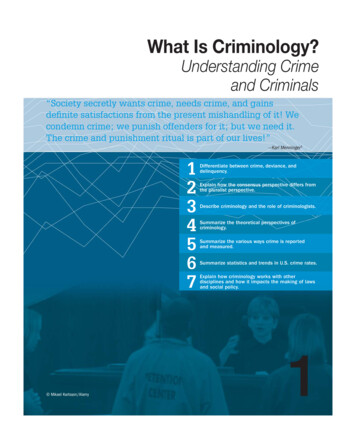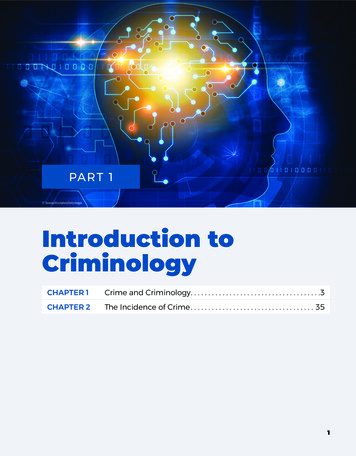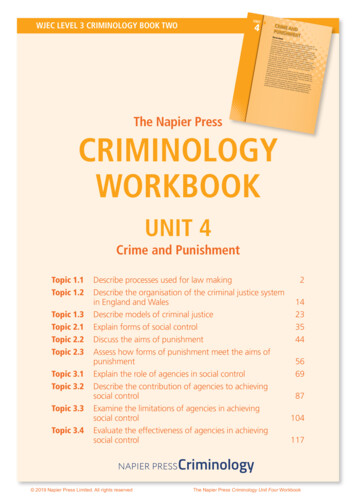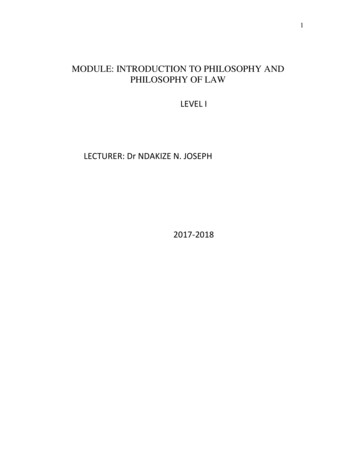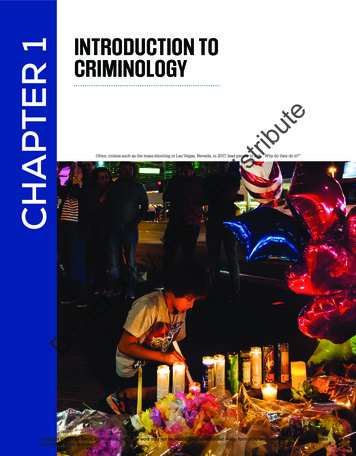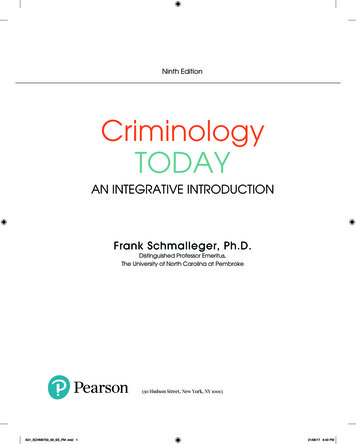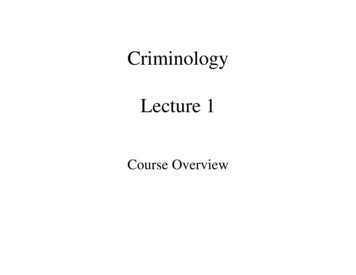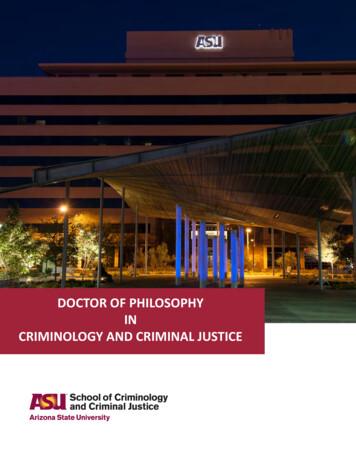
Transcription
DOCTOR OF PHILOSOPHYINCRIMINOLOGY AND CRIMINAL JUSTICE
WelcomeWe invite you to look at the exciting new developments in research inASU’s School of Criminology and Criminal Justice. Faculty members in theSchool are leaders in their respective fields of study. Faculty are involved inimportant and policy-relevant research on issues such as police-communityrelations, use of technology by the police, mass incarceration and itsconsequences, racial profiling by criminal justice agencies, the response ofthe criminal justice system to crimes such as domestic violence and sexualassault, neighborhoods and crime, and gangs and crime. The results fromthese projects and related publications (books, journal articles, etc.) areincorporated into the classes we teach; they also inform policy and practiceat the state, national and international levels.In addition, the School of Criminology has a number of Research Centers andLabs:The Center for Correctional Solutions (CCS) enhances the lives of thoseliving and working in our correctional system.The Center for Problem-Oriented Policing (POP Center) works toadvance the concept and practice of problem-oriented policing.The Center for Public Criminology (CPC) aims to make criminologicalresearch widely available in a form that can be used by multiplestakeholders.The Center for Spacial Reasoning & Policy Analytics (CSRPA) promotestransdisciplinary approaches to problem-solving, leveraging spatialanalytics, geodesign and geovisualization techniques for enhancingdecision making and improving public policy.The Watts Family Center for Violence Prevention and CommunitySafety (CVPCS) evaluates criminal justice policies and programs, with afocus on analyzing and evaluating patterns and causes of violence.TABLE OF CONTENTSProgram Overview3AdmissionRequirements4PhD Program Coursework 5 - 8Graduate Student Policies 8 - 15Expectations forGraduate Teachingand Research Assistants 15Graduate College Guides& Information forDoctoral Students16 - 20Student Resources21Research Centersand Labs24Contact Information25The Developmental Etiology of Externalizing Problems (DEEP) labfocuses the precursors and outcomes associated with the developmentof antisocial and substance using behaviors from childhood toadulthood.In 2018, U.S. News and World Report ranked Arizona State University’sgraduate degree programs within the College of Public Service andCommunity Solutions among some of the best in the nation. The ASU Schoolof Criminology and Criminal Justice graduate criminology program is rankedNo. 5 in the nation. This ranking is a reflection of our dedication to graduateeducation, research and scholarship.Welcome to the School of Criminology and Criminal Justice!Dr. Michael White, ProfessorDirector, Ph.D. ProgramAssociate Director, Center for Violence Prevention & Community SafetyASU School of Criminology and Criminal JusticePhD Guide 2018 -19Contact:Shannon StewartAcademic Success CoordinatorGraduate ProgramsShannon.Stewart@asu.eduREVISED: JULY 2, 20182
3PROGRAM OVERVIEWThe School of Criminology and Criminal Justice at Arizona State University offers a program of courseworkand research leading to the PhD in Criminology and Criminal Justice. This program emphasizes criminaljustice theory, research, and policy. The program is designed to produce highly skilled criminology andcriminal justice faculty and agency researchers and administrators.The PhD program in criminology and criminal justice is organized around five components:(1)(2)(3)(4)(5)a core of required courses in theory and research on crime and the criminal justice system;a core of required courses on research methods and analytical techniques;a elective courses on criminology, criminal justice, and related fields;a comprehensive examination; anda dissertationA minimum of 84 credit hours are required to complete the degree. This includes a minimum of 72 hoursof coursework and 12 hours of dissertation. A maximum of 30 hours of course work from a previouslyawarded master’s degree or juris doctor degree may, with the approval of the graduate committee, beapplied toward the doctoral program of study.The theory and research on crime and criminal justice core includes two required courses:(1) Seminar on Criminological Theory; and(2) Seminar on Criminal Justice Policies and PracticesThe research methods and analytical techniques core includes three required courses:(1) Advanced Research Design;(2) Advanced Statistical Analysis; and(3) Special Problems in Quantitative MethodsElective courses may include graduate courses in criminology and criminal justice and related disciplines(e.g., sociology, political science, public administration, psychology). Students will take a comprehensiveexamination and will write a dissertation that reflects original scholarship and contributes to the body ofknowledge in the field of criminology and criminal justice.ASU School of Criminology and Criminal JusticePhD Guide 2018 -193
ADMISSION REQUIREMENTSAdmission to the program is governed by the requirements specified by the Graduate College at Arizona State University.In addition to the basic requirements established by the Graduate College, the School of Criminology and Criminal Justicerequires the following: An earned Master’s degree or a juris doctor degree from an accredited institution. The Master’s degree may bea degree in criminal justice, criminology, or another related field (e.g., sociology, political science, history, socialwork, public administration, psychology, or philosophy). Outstanding students with a baccalaureate degree may be admitted directly into the PhD program. Thesestudents’ work will be reviewed after completion of 30 hours of graduate coursework. Students whose workpasses the review are awarded the Master of Arts in Passing.All applicants must submit the following admissions materials: An official ASU Graduate College admissions application and application fee. Please visit: https://students.asu.edu/graduate/apply A personal statement, not exceeding five pages, that describes the applicant’s prior education, relevantprofessional experience, research interests and career goals, and that explains how the Ph.D. in Criminology andCriminal Justice will help the applicant attain his/her career goals. The statement should explicitly explain how thestudent’s plans are consistent with the role and mission of the School of Criminology and Criminal Justice at ASU. A resume/curriculum vitae. A writing sample. Official GRE General Test scores (verbal, quantitative, analytical) - GRE institution code: 4007. Only test scoresfrom within the past 5 years will be accepted. Please visit: http://www.ets.org/gre Two letters of reference from faculty members or others qualified to evaluate the applicant’s academic potentialfor doctoral study. International students seeking admission to the program must meet ASU Graduate College requirementsgoverning the admission of international students. Please visit: http://graduate.asu.edu/admissions/international Official transcripts (electronic or hard copy) from all institutions attended must be sent to ASU. Plase note, ASUalumni transcripts are on file.Electronic TranscriptsASU will accept the following electronic transcript services: E-Scrip, Parchment, Credentials Inc., TranscriptsPlus, andNational Student Clearinghouse. Transcripts must be sent directly to gradtranscripts@asu.edu from those transcriptservices or from the institution that uses those services.ORHard Copy Transcripts:If sending by U.S. Mail:Arizona State UniversityGraduate Admission ServicesPO Box 870112Tempe, AZ 85287-0112ASU School of Criminology and Criminal JusticePhD Guide 2018 -19If sending by FedEx, DHL or UPS:Graduate Admission ServicesArizona State University1151 S. Forest Avenue, #SSV112Tempe, AZ 85287-01124
The deadline for submission of all application materials for the PhD program is January 15th for fall admission eachyear. No late applications will be accepted. The School’s Graduate Admissions Committee will make recommendationsfor student admissions in February/March. Newly admitted students will begin taking courses in the fall semester ofeach year. Admission is competitive; a limited number of well-qualified applicants will be admitted each year. If morestudents apply than the School can reasonably accept for admission in any given year, the Committee will admit thosemost qualified. A small number of students may be admitted with a funding package that includes a stipend, tuitionremission, and health insurance. Funded students will be assigned a research assistantship and work with an assignedfaculty member for 20 hours per week.PhD PROGRAM COURSEWORKREQUIRED AND ELECTIVE COURSEWORKThe PhD in Criminology and Criminal Justice requires a minimum of 84 hours of graduate course work beyond thebaccalaureate. Each student is required to complete course work in two core areas. This includes six hours of coursework in theory and the criminal justice system, and nine hours of course work on research methods and analyticaltechniques. Elective courses comprise the remainder of the course work required for the PhD. All students mustdemonstrate proficiency in research and methodological skills.The following section gives the details of the required course work for the PhD in Criminology and Criminal Justice:Required Courses (15 hours)Core Area I:Theory & Research on Crime & the Criminal Justice System (6 hrs) CRJ 601 Seminar on Criminological Theory CRJ 602 Seminar on Criminal Justice Policies and PracticesCore Area II:Research Methods & Analytical Techniques (9 hrs) CRJ 603 Advanced Research Design CRJ 604 Advanced Statistical Analysis CRJ 605 Special Problems in Quantitative MethodsElective Courses and Research (27 hours)In consultation with the Graduate Supervisory Committee, students will select a minimum of 27 hours of elective coursework; this may include a maximum of 6 hours of CRJ 792 (Research). Elective course work may include courses offeredby the School of Criminology and Criminal Justice and courses offered by other schools/departments at ASU. Studentsmay take either 500-level or 600-level courses.Dissertation (12 hours)CRJ 799 DissertationNote: CRJ 792 (Research) may only be taken upon approval of the Graduate Supervisory Committee and the PhD Program Director.No more than six credits of CRJ 792 (Research) may be counted towards the program of study.SUMMARY OF MINIMUM REQUIREMENTSCore Area I 6 hoursCore Area II 9 hoursSpecialty Area/Electives 57 hours (may include 30 hours of course work for master’s degree)Dissertation 12 hoursMinimum Total Hours Beyond Bachelor's Degree 84ASU School of Criminology and Criminal JusticePhD Guide 2018 -195
DESCRIPTION OF GRADUATE COURSESDescriptions of graduate courses offered by the School of Criminology and Criminal Justice are provided below. Additional information regarding the course syllabus and course requirements can be obtained from faculty membersassigned to teach the course.Required Courses:CRJ 601 (3 hrs) Seminar on Criminological Theory.This course will consider historical and contemporaryexplanations of crime and criminal behavior. Theoriescovered include strain, control, cultural, labeling, conflict,as well as more recent attempts at theoretical integrationand multidisciplinary integration.CRJ 602 (3 hrs) Seminar on Criminal Justice Policies andPractices. This course will provide students with a criticalunderstanding of responses to crime and the operationof the criminal justice system. Particular emphasis isplaced on theory and research on the effectiveness ofthe policies and practices of the principal institutionsof the criminal justice system - the police, courts,corrections, and the juvenile justice system. Additionally,philosophical and practical matters pertaining to justiceand fairness in the administration of the criminal law areexplored.CRJ 603 (3 hrs) Advanced Research Design. This coursewill expose students to advanced topics in researchdesign and methodology in preparation for writing thedoctoral dissertation. The course will center on variousresearch methods to address the primary researchproblems in the study of crime, law, criminal justice, andthe impact of the criminal justice system.CRJ 604 (3 hrs) Advanced Statistical Analysis. Thiscourse will instruct students on the use and applicationof advanced statistical techniques and software. Topicsinclude: factor analysis, binary, multinomial, and ordinallogistic regression, Poisson and negative binomial models,Tobit models, and advanced OLS estimation strategiesand post-estimation diagnostics.CRJ 605 (3 hrs) Special Problems in QuantitativeMethods. This course will explore advanced techniquesof statistical analysis within the field of criminal justice.Topics may include: time-series analysis, structuralequation modeling, hierarchical linear modeling, groupbased trajectory models, structural equation models,instrumental variables, propensity score matching, andother advanced topics. It assumes that students havetaken courses in basic descriptive and inferential statisticsand advanced multivariate analysis of variance andregression.Elective Courses:CRJ 501 (3 hrs) Seminar in Criminal Justice. An overviewof the American Criminal Justice System with emphasison policy issues in police, courts, sentencing, corrections,and the juvenile justice system.CRJ 502 (3 hrs) Seminar in Criminology. Theory andresearch on the nature, causes and prediction of criminalbehavior and criminal careers.CRJ 503 (3 hrs) Research Methods in Criminal Justice. Anintroduction to data analysis and an overview of researchmethods used in social science research, includingexperimental design, survey research, field research, andevaluation research.CRJ 504 (3 hrs) Statistical Tools for Criminal Justice. Thiscourse focuses on essential statistical analysis that can beused by persons working in criminal justice and relatedagencies.ASU School of Criminology and Criminal JusticePhD Guide 2018 -19CRJ 512 (3 hrs) Seminar in Policing. Review of researchon policing and police organizations. Seminar examinesresearch on police strategies and practices designed toaddress crime.CRJ 513 (3 hrs) Seminar in Courts and Sentencing. Anoverview of theoretical perspectives and research on thecourts, with a focus on prosecutorial and judicial decisionmaking.CRJ 514 (3 hrs) Seminar in Corrections. Theory, research,and policy issues regarding community-based andinstitutional corrections programs.CRJ 515 (3 hrs) Seminar on Women and Crime.Introduces students to issues regarding women andthe criminal justice system, focusing on their roles asoffenders, victims, and professionals.6
CRJ 516 (3 hrs) Seminar in Criminal Justice Organizationand Mgmt. This course will focus on how criminal justiceorganizations function and are structured. Oganizationsin general and the theories associated with them willbe examined. Effective leadership techniques and howorganizations exert power will also be explored.CRJ 517 (3 hrs) Seminar on Juvenile Delinquency andJuvenile Justice. This course will examine patternsand correlates of delinquency within the context offoundations and contemporary theories of delinquency.Research on decision making by officials in the juvenilejustice system also will be reviewed.CRJ 518 (3 hrs) Seminar on Race/Ethnicity, Crime andJustice. This course will examine theoretical perspectivesand research on the overrepresentation of racialminorities as victims, offenders, and defendants in thecriminal justice system.CRJ 519 (3 hrs) Seminar on Victimization. This courseexamines theory and research concerning victimizationand consequences of victimization for victims, society,and the justice system. Also explored are effectiveresponses to victims’ post-crime needs.CRJ 520 (3 hrs) Seminar on Violent Crime. Examinationof patterns/correlates of violent crime as well asprevention strategies and policy implications.CRJ 521 (3 hrs) Seminar on the Nature of Crime.Examination of patterns/correlates of crime at individual,situational, and aggregate levels. Topics include definingcrime, offending topologies, and criminal careers.CRJ 522 (3 hrs) Seminar on Gangs and Crime. Theoreticalperspectives and research on gangs and crime, andon the role of the community and the criminal justicesystem in the causes and control of gang membershipand gang crime.CRJ 524 (3 hrs) Seminar on Punishment and Society.This course will examine the fundamental philosophicalprinciples of justice and punishment. A comparative andhistorical perspective will be included.CRJ 525 (3 hrs) Seminar on Life-Course Criminology. Thiscourse will provide an intensive examination of lifecourse explanations of crime, the life course perspectiveas a theoretical orientation, and research methods usedin life-course research.CRJ 526 (3 hrs) Seminar on Theories of Crime Causation.This course will provide an overview of the majortheoretical statements on crime causation, especiallythose explanations that focus on individual-level criminaloffending.ASU School of Criminology and Criminal JusticePhD Guide 2018 -19CRJ 598 (3 hrs) Special Topics in Criminal Justice. Topicsmay include restorative justice, drugs and crime,community policing, community corrections, crimeprevention, and legal issues.CRJ 606 (3 hrs) Advanced Topics in TheoreticalCriminology. This course will focus on criminologicaltheory construction, historical and contemporarytheoretical debates within criminology, theory testing,empirical support for theories, and theoreticalintegration.CRJ 607 (3 hrs) Advanced Topics in Policing. Thisseminar is designed to cover the major issues relatedto policing and police organizations in the UnitedStates. The principal focus will be on policing andpolice organizations in large cities, with a focus onpolice organizational structure, police culture, policeorganizational environment, police decision making, andchange in the police organization.CRJ 608 (3 hrs) Advanced Topics in Courts andSentencing. This course will focus on the structure,organization, and operation of the state and federalcourt systems in the United States. The purpose of thecourse is to survey recent research on the dynamicsof courthouse justice--charging, plea bargaining, baildecision making, jury decision making and sentencing.The course also will examine research assessing theimpact of recent reforms directed at the criminal courtsystem.CRJ 609 (3 hrs) Advanced Topics in Corrections. Thisseminar will provide a critical examination of thetheoretical framework underpinning current correctionalpolicy (institutional and community-based), as well asadvanced, in-depth analyses of contemporary issuessurrounding corrections.CRJ 610 (3 hrs) Advanced Topics in Juvenile Justice. Thisadvanced course in juvenile justice will examine themeaning of the concept of juvenile delinquency as aseparate entity in the criminal justice system. Coursecontent will consider the relationship between socialattitudes and definitions of youthful law violation, andreview studies on various forms of delinquency, such asdrug offenses, sex delinquency, and status offenders.Students will also focus on the internal workings of thejuvenile justice system.CRJ 611 (3 hrs) Advanced Topics in Crime andVictimization. This course will examine research oncriminal offending and victimization, focusing on thecorrelates of offending and victimization, risk andprotective factors, and policies designed to reduce theimpact of crime on victims.7
CRJ 612 (3 hrs) Advanced Topics in Race/Genderand Crime and Justice. This course will examine theinterrelationships among race/ethnicity, gender,crime and the criminal justice system. It will focus ontheoretical perspectives and empirical research on racialminorities and women as victims, offenders, and criminaljustice professionals.CRJ 613 (3 hrs) Qualitative Methods. This course willprovide students with an examination of the design,execution, and write-up of qualitative research. Methodsof data collection including participant-observation,ethnography, and interviewing will be discussed.CRJ 792 (1-6 hrs) Research. Independent study in whicha student, under the supervision of a faculty member,conducts research that is expected to lead to a specificproject, such as a dissertation, report, or publication.Assignments might include data collection, experimentalwork, data analysis, or preparation of a manuscript.PROGRAM TIMELINEYear One - Three Coursework, required and elective - 9 credits hours each Spring and Fall semester (full-time status)Year Two - Three Comprehensive Exam with two questions (Theory, Systems) Identify your Dissertation CommitteeYears Three- Five Dissertation Prospectus Developed with the Dissertation CommitteeIncludes (1) a statement of the problem; (2) a comprehensive literaturereview; and (3) a detailed discussion of the research design/methodology.Oral Defense with the Dissertation Committee and faculty.DissertationMust reflect original scholarship and contribute to the body of knowledgeon criminal justice.The Oral Dissertation Defense is open to all members of the universitycommunity. The defense engages the student and Supervisory Committeein a critical, analytical discussion of the research, the findings of the study,and implications.GRADUATE STUDENT POLICIESAs a graduate student in the School of Criminology and Criminal Justice, students should be aware of and observe all ofthe procedures and requirements outlined in the ASU Graduate College Policies and Procedures handbook and in thishandbook. Students are expected to remain informed about the general policies concerning graduate studies and thespecific requirements of this program. In addition, students should frequently check their MyASU account and ASUemail for the most up-to-date information regarding status, holds, items to attend to and other important information.ASU School of Criminology and Criminal JusticePhD Guide 2018 -198
REGISTRATIONEach student is assigned an enrollment appointment which allows online registration for the upcoming term. Anenrollment appointment is the date and time that the student can begin registering; he/she may register any time fromthe date of the enrollment appointment through the end of the registration period. The easiest way to add a class is bysigning into My ASU, clicking on the “Registration” link in the My Classes box, and selecting “Add.” Students may add aclass to their schedule up until the drop/add deadline for that class. For information about deadlines or adding a classplease visit: https://students.asu.edu/drop-add. For registration deadlines please see the academic calendar which canbe found at: WALSStudents may remove a class from their current schedule by dropping/withdrawing from it up until the appropriatedeadline for that class. Students can request a drop/withdrawal from a class by signing into myASU, clicking on the“Registration” link in the My Classes section and selecting “Drop/Withdrawal.”COURSE LOADGraduate student enrollment status is as follows:Full-time9 credit hours¾ time7-8 credit hoursHalf time5-6 credit hoursLess than half time1-4 credit hoursAll teaching and research assistants must enroll for a minimum of six semester hours (no audit credit) during eachsemester (fall and spring) of their appointment. Enrollment in continuing registration (CRJ 795) does not fulfill the sixhour requirement. Teaching and research assistants may not register for more than 12 semester hours of course workeach semester.PRE-ADMISSION CREDITSCredit hours completed at ASU or from another regionally accredited US institution or international institution officiallyrecognized by that country, before the semester and year of admission to an ASU graduate degree program, areconsidered pre-admission credits. With the approval of the degree program and the Graduate College, students mayinclude a maximum of 12 graduate-level credit hours with grades of “B” or better that were not used towards a previousdegree. Preadmission credits must have been taken within three years of admission to the ASU degree program to beaccepted. Official transcripts must be sent to Graduate Admission Services from the records office of the institutionwhere the credits were earned. Certain types of credits cannot be transferred to ASU. Academic credits earned atinstitutions other than ASU that base their credit calculation on a different scale from ASU’s are subject to conversionbefore inclusion on a Plan of Study. In all cases, the inclusion of transfer courses on a Plan of Study is subject to approvalby the degree program and the Dean of the Graduate College. For more information about pre-admission credit pleasesee the Graduate College handbook at NUOUS ENROLLMENTOnce admitted to a graduate degree program students must be registered for a minimum of one credit hour during allphases of their graduate education, including the term in which they graduate. This includes periods when studentsare engaged in research, conducting a doctoral prospectus, working on or defending theses or dissertations, takingcomprehensive examinations, or in any other way utilizing university resources, facilities or faculty time.ASU School of Criminology and Criminal JusticePhD Guide 2018 -199
Registration for every fall semester and spring semester is required. Summer registration is required for students takingexaminations, completing culminating experiences, conducting a doctoral prospectus, defending theses or dissertations,or graduating from the degree program. For doctoral students to maintain continuous enrollment the credit hour(s)must:Appear on the student’s Plan of Study, ORBe research (CRJ 792), dissertation (CRJ 799), or continuing registration (CRJ 795), ORBe a graduate-level course.Grades of “W” and/or “X” are not considered valid registration for continuous enrollment purposes. “W” grades arereceived when students officially withdraw from a course after the drop/add period. “X” grades are received for auditcourses. Additionally, students completing work for a course in which they received a grade of “I” must maintaincontinuous enrollment as defined previously.REQUEST TO MAINTAIN CONTINUOUS ENROLLMENT/LEAVE OF ABSENCE REQUESTStudents planning to discontinue enrollment for a semester or more must request approval for a leave of absence.Students may petition the Graduate College for a leave of absence for a maximum of two semesters during their entireprogram. A petition for a leave of absence, endorsed by the members of the student’s supervisory committee and thehead of the academic unit, must be approved by the Graduate College dean. This request must be filed and approvedbefore the beginning of the enrollment period in which the absence will take place.An approved leave of absence will enable students to re-enter their program without re-applying to the university.Students who do not enroll for a fall or spring semester without an approved leave of absence by Graduate College areconsidered withdrawn from the university under the assumption that they have decided to discontinue their program.Students removed for this reason may reapply for admission to resume their degree program; the application will beconsidered along with all other new applications to the degree program.A student with a Graduate College approved Request to Maintain Continuous Enrollment is not required to pay tuitionand/or fees, but in turn is not permitted to place any demands on university faculty or use any university resources.These resources include university libraries, laboratories, recreation facilities or faculty time.The Request to Maintain Continuous Enrollment form can be found on the Graduate College website at: https://graduate.asu.edu/file/680.UNIVERSITY POLICY ON INCOMPLETESA grade of “I” (incomplete) is given by the instructor only when a student who is otherwise doing acceptable workIs unable to complete a course. A “Request for Grade of Incomplete” form must be completed by the student withthe understanding that the work is to be completed within one calendar year. A student does not have to reregisteror pay fees for a course where a grade of incomplete has been received in order to complete the course. If the workhas not been completed after one calendar year, the mark of incomplete transfers to an “I” and becomes a permanentpart of the transcript. To repeat the course for credit, a student must reregister and pay fees. The grade for therepeated course will appear on the transcript but will not replace the permanent “I.” Additional information regardingincomplete grades can be found at: GRADUATE SUPERVISORY COMMITTEEDuring the spring semester of the first year of doctoral coursework, each student forms a graduate supervisorycommittee, composed of a chair and at least two members who are designated as Graduate Faculty. This committeeserves as the intellectual guide for the student during the first three years of the program.ASU School of Criminology and Criminal JusticePhD Guide 2018 -1910
Graduate faculty can serve as dissertation committee chairs or members, formal or informal mentors, or simply offermulti-disciplinary perspectives on your research. Additional information regarding Graduate Faculty can be found athttps://graduateapps.asu.edu/graduate-faculty/ degree/PPCRJPHD.PLAN OF STUDYDuring the spring semester of the first year of doctoral coursework, the Graduate Supervisory Committee will meet withthe student to assess progress, and to approve the Plan of Study (POS) for the doctoral degree. Following approval of thePOS, the student files the online Interactive Plan of Study (iPOS).During each subsequent spring semester, the Graduate Supervisory Committee meets with the student to review thestudent’s progress towa
The PhD program in criminology and criminal justice is organized around five components: (1)ore of required courses in theory and research on crime and the criminal justice system; a c (2)ore of required courses on research methods and analytical techniques; a c (3) a elective courses on criminology, criminal justice, and related fields;
